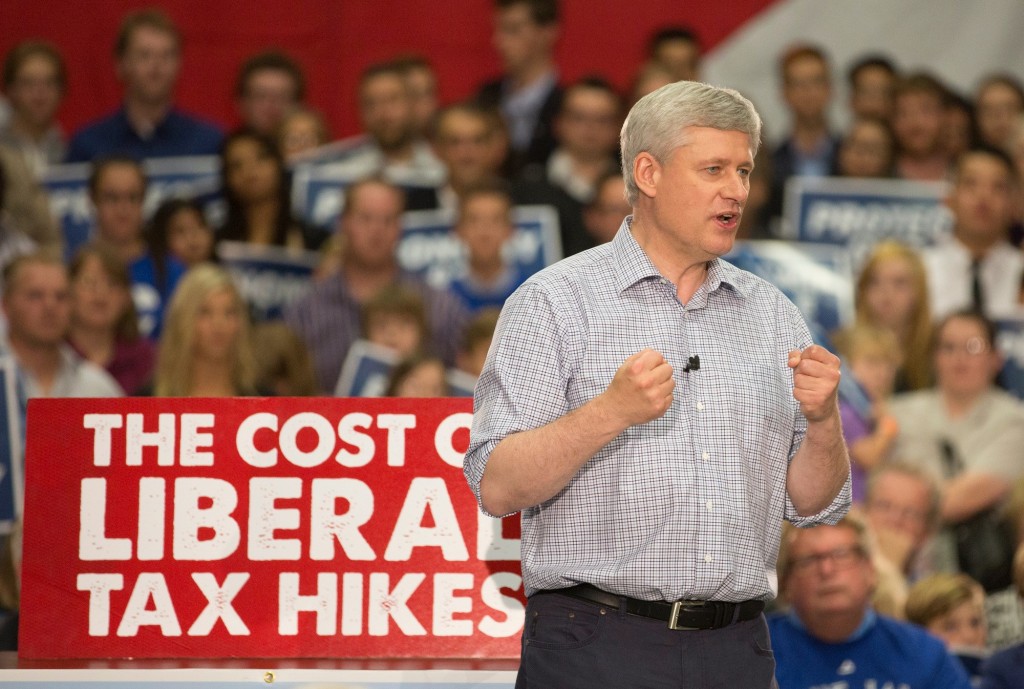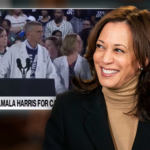Blog Post
Harper on the Home Stretch
By Jonathon Van Maren
We’re in the final stretch of one of the longest elections in Canadian history, and the leaders are starting to look pretty tired. When I went out to a Harper campaign event on August 27, the prime minister was jovial, joking off-the-cuff and seemingly at ease. This morning in a Brantford manufacturing plant, Stephen Harper looked tired. For an introvert that, as John Ibbitson wrote in his recent Harper biography, isn’t particularly comfortable with the non-stop public campaigning that comes with the job, it isn’t surprising that the grueling schedule might begin to wear him down. That, and the poll numbers this week have the Liberals salivating.
It’s been fascinating to watch the left-wing element in this country slowly lose their minds over Stephen Harper. The well-known “Harper Derangement Syndrome” is reaching a screechy fever-pitch as the anti-Harper crowd scrabbles at the victory that seems within their reach. Harper is apparently destroying democracy, warring against science, and crushing the poor, all while petting a cat in a very sinister fashion. This leveled against a prime minister who has consistently faced the criticism from his own base of not being conservative enough. I genuinely wonder, when I see the scores of hysterical Facebook posts being made by my pals from back in university, if any of them truly believe that Canada has morphed into the Mordor the Left claims it has under the rather bland and managerial leadership of Mr. Harper.
Part of the problem is that the media, who have at least attempted to be somewhat careful in the past, are now openly gunning for Harper and the Conservatives. In fact, the Canadian Media Guild, representing over 6,000 journalists, has officially registered as a third-party campaigner in this election. This morning, I almost laughed out loud when one reporter from the Toronto Star asked Stephen Harper about a campaign event in Toronto being hosted by Rob Ford, Toronto’s infamous ex-mayor (and we hope ex-crack smoker.) She actually ended the question with: “So what’s up with that?” Harper, of course, responded to the questions the way all politicians do: Briefly acknowledge that a point has been raised by the reporter, and then pivot to the talking points. But the back-and-forth is more two opposing sides making a statement rather than any substantive give-and-take.
The mutual antagonism is openly acknowledged. Before the media was allowed into the plant this morning, Conservative spokesman (and former Sun News Network boss) Kory Teneycke took the microphone to ask the crowd to be nice to the media, assuring us with obvious sarcasm that the media loves to say nice things about Mr. Harper. It was a joke, and everyone laughed, because everyone is in on the joke. Conservative supporters know that reporters despise their party, and Teneycke was just reminding everyone not to tell them off and give them an excuse to avoid reporting on Mr. Harper’s talking points.
It’s the same with the ironic accusations by the Liberals that the rather tame Conservative “he’s just not ready” attack ads show a relentlessly ruthless and negative Conservative Party. Conservatives have been the butt of the worst smears and slanders the Liberal Party can conjure up for years—and the Conservative memory is not that short. From John Ibbitson’s Harper biography:
The Liberals generally ran a foul campaign. Future critics of Conservative hardball tactics forget that in 2000, the Liberal leader warned that the Alliance [Party] appealed to “the dark side that exists in human beings.” In case that was too subtle, Immigration Minister Elinor Caplan warned that the Alliance was supported by “Holocaust deniers, prominent bigots and racists,” while Markham Liberal candidate John McCallum claimed that “at best, the Canadian Alliance tolerates the presence of new Canadians.”
For all of the Liberal babble about Conservative “dog-whistle” tactics—a tacit accusation that the Conservative Party is filled with racists—it is again the Liberals who are playing the “politics of fear,” with Justin Trudeau suggestively asking what Stephen Harper meant by the phrase “old stock Canadians.” Obviously, of course, that question is meant to insinuate that Stephen Harper is somehow racist, a rather puerile accusation, especially in our current politically correct climate. The charge that Trudeau is “just not ready” is undeniably tame compared to what Trudeau is dog-whistling.
And then, of course, we should be reminded of the ads the Liberals ran against Harper in 2004, when they were plunging in the polls. From Ibbitson:
The Liberals set out to arrest that slide with the most negative television ads ever aired on Canadian television. Those who believe that the Conservatives sank to new lows with their ads attacking Stephane Dion and Michael Ignatieff should refresh their memories via YouTube. While the Conservatives were undoubtedly effective in branding the future Liberal leaders with saturation pre-writ advertising, in terms of the actual content of the ads, the Tories have never come close to the public slandering Harper received in, for example, the Liberal “Truth” ad.
And that’s not to mention, of course, the infamous “Stephen Harper wants soldiers with guns in Canadian cities” ad. For some reason, Justin Trudeau can get away with saying utterly meaningless and incoherent things without anyone calling him on it. He accuses Conservatives of “the politics of division,” for example. I know he’s new to politics, but the fact is that division is the very nature of politics—convincing enough undecided voters to pick your team instead of the other guy’s team is sort of how it works. The Liberals are hoping—not without good reason—that the Canadian public will ignore its own tactics and actually begin to perceive the Conservatives as “divisive” and “fearful.” More likely, the biggest threat to the Conservatives is simply that Canadians have a habit of voting in someone new every few years, since “change” has such a lovely ring to it.
But back to the Brantford campaign stop. It was standard Conservative fare, a laundry list of various tax cuts, tax credits, and other promises. Harper did manage a few jokes–“You make it, they take it, they spend it”—as well as illustrating the cost of Liberal policies by getting two elderly volunteers to pile up on a table exactly how much money, in tens and twenties, they would lose under a Trudeau government. “Trudeau talks about change,” Harper announced to cheers and applause, “But this”—gesturing to the pile of money—“is more than change.” The crowd was enthusiastic and generous with its applause, but of course, it was a pre-approved crowd in the first place. When a Conservative spokesman can commiserate about the media with the crowd before the reporters are allowed in, it’s pretty obvious that there isn’t going to be much booing. Amid dozens of handshakes and selfies, the crowd dispersed.
The election is a mere five days away, and if the polls hold, it’s not looking great for the Conservative Party. I myself will be voting Conservative, because I have a great pro-life candidate to vote for—but I understand that many others who hold the moral fabric of our nation rather than the economy to be their number one priority may have more difficult choices to make. I’ve found much to dislike about many Conservative policies, but when I look at the moral issues looming large, such as euthanasia and the potential of a Liberal government repealing the Conservative’s phenomenal legislation on prostitution and human trafficking, I shudder to think what a second Trudeau might manage to do.
In the meantime, to my fellow pro-life Canadians: Consult Campaign Life Coalition’s Voting Guide, find the closest pro-life candidate to you, and call their campaign office. Offer to give them a hand. On Election Day, the number one priority will be to get voters to the polls, and you can help them. Be sure to let them know that you’re there because you support their position on protecting human life. This election will be very close, and we need to engage in the process and ensure that our voices are heard.
After all, when the polls close on October 19, our task of building a culture of life in Canada is as pressing as ever.








